The majority of people associate stomach discomfort with overeating or dietary intolerance. A lesser-known but crucial cause of bloating and gas is an enzyme deficiency, particularly lipase. But what is lipase, and how does its absence affect digestion?
In this article, we’ll look at how lipase works, the indications of a deficit, and whether it could be causing your digestive problems.
What is Lipase?
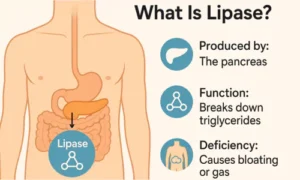
Lipase is a digestive enzyme that largely degrades dietary lipids into smaller molecules such as fatty acids and glycerol, which the body may readily absorb. It is made by the pancreas and released into the small intestine.
Without adequate lipase, fats stay undigested and can ferment in the gut, resulting in a variety of digestive problems.
Can Lipase Deficiency Cause Bloating or Gas?
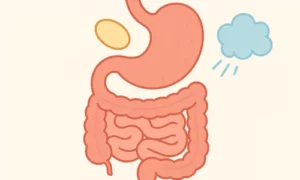
Yes, lipase deficiency can contribute to bloating and gas, but it is not the only possible cause. Here’s how.
1. Undigested fats ferment in the gut
When lipids are not effectively broken down, they enter the intestines and ferment, interacting with gut flora. This process may result in the emission of surplus gas.
2. Slower digestion
Fat digestion becomes inefficient, slowing the digestive process and causing bloating, heaviness, and stomach pain.
3. Fat Malabsorption
Unabsorbed fat can induce loose, greasy stools (steatorrhea), as well as gas and cramping, which are common symptoms of lipase insufficiency.
Common symptoms of lipase deficiency
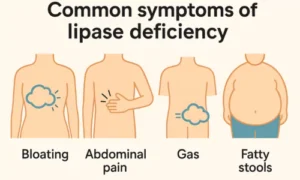
If your body does not produce enough lipase, you may notice:
1. Frequent bloating after consuming fatty foods
2. Excessive gas and belching
3. Abdominal discomfort or agony.
4. Greasy or floating stools.
5. Unexplained weight loss
6. Fat-soluble vitamin deficits (A, D, E, and K)
What Causes Lipase Deficiency?
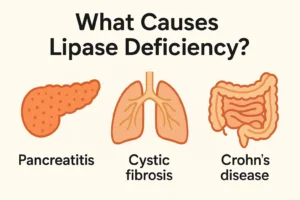
Several conditions can result in reduced lipase production:
1. Pancreatic insufficiency (e.g., in cystic fibrosis or chronic pancreatitis)
3. Gallbladder disorders
4. Ageing and poor dietary habits
How Is It Diagnosed?
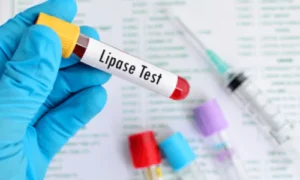
Doctors may propose the following tests to identify lipase deficiency:
1. Stool tests to determine fat content.
2. Blood testing to determine enzyme levels
3. Pancreatic Function Tests
4. Imaging (such as CT or MRI) to assess pancreatic health.
Can Lipase Supplements Help?
Yes, lipase pills (as part of pancreatic enzyme replacement treatment) can be used to promote fat digestion and relieve symptoms such as bloating and gas. They are frequently consumed with meals to aid in digestion.
Lifestyle and Dietary Tips
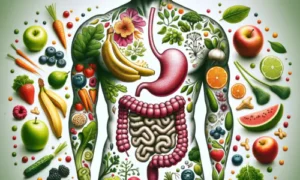
If you suspect lipase deficiency, consider the following tips:
1. Eat smaller, more frequent meals
2. Reduce intake of high-fat foods
3. Include more enzyme-rich foods (pineapple, avocado, fermented foods)
4. Stay hydrated
5. Avoid processed and oily snacks
Always consult a gastroenterologist or dietitian before starting supplements or changing your diet.
Conclusion
While bloating and gas are common, chronic digestive discomfort, particularly after consuming fatty foods, may indicate a more serious condition, such as lipase insufficiency. This enzyme is essential for fat breakdown; without it, undigested fats can cause bloating, gas, and other gastrointestinal problems.
If you’re experiencing ongoing stomach problems, you should seek medical attention. Proper diagnosis and therapy, such as enzyme supplements and dietary modifications, can greatly improve your quality of life and gut health.






